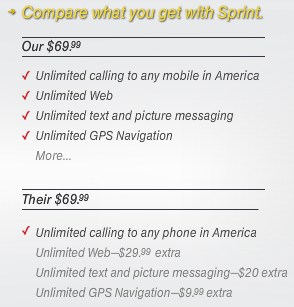 Sprint, America’s third largest mobile phone and wireless company, has launched a marketing war on its bigger competitors AT&T and Verizon Wireless scoffing at both providers’ $69.99 “unlimited” calling plans.
Sprint, America’s third largest mobile phone and wireless company, has launched a marketing war on its bigger competitors AT&T and Verizon Wireless scoffing at both providers’ $69.99 “unlimited” calling plans.
“Recently AT&T and Verizon have attempted to confuse the marketplace by lowering their pricing to $69.99, but theirs are for calling only,” said Mike Goff, Sprint’s vice president of corporate marketing.
 Sprint launched a new advertising campaign this morning featuring CEO Dan Hesse calling out both carriers for effectively confusing consumers.
Sprint launched a new advertising campaign this morning featuring CEO Dan Hesse calling out both carriers for effectively confusing consumers.
Hesse explains most people use their cell phones for more than just making and receiving calls. Hesse said his larger competitors charge substantially more to use data services, and that many of the latest handsets don’t qualify for the special pricing.
Both AT&T and Verizon Wireless have started to require consumers with so-called “smartphones” to sign up with a data plan, adding to the customer’s bill whether or not they actually use such services. Sprint says their unlimited plan also bundles unlimited web browsing, texting, and GPS navigation for the same price — $69.99, available on any phone they sell.
Sprint has had its hands full trying to stem the ongoing loss of its customers to larger competitors.
AT&T has benefited from an exclusive sales agreement for Apple’s iPhone, while Verizon Wireless achieved the top spot among U.S. carriers for its perceived widest coverage area. Sprint has neither, and historically poor customer service to boot.
Will Sprint’s new campaign make an impact?
Roger Entner, head of telecom research for the Nielsen Co., told Brandweek that AT&T and Verizon are in such a commanding position in the market right now that they are unlikely to respond to Sprint. “They have the luxury of being able to ignore [Sprint],” said Entner, who noted that both AT&T and Verizon added millions of new subscribers in the fourth quarter, many at Sprint’s expense.
Sprint has managed to at least slow customer defections. In the last quarter of 2009, Sprint lost 148,000 subscribers. The previous quarter, the company lost 545,000 customers.
[flv width=”640″ height=”378″]http://www.phillipdampier.com/video/Sprint Ad – Just Phone Calls 3-2-2010.flv[/flv]
Sprint CEO Dan Hesse explains why their $69.99 plan is “better” than the competition in this new advertisement.


 Subscribe
Subscribe





